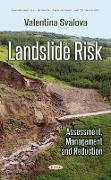- Start
- Landslide Risk
Landslide Risk
Angebote / Angebote:
A landslide is a major geological hazard, which poses a serious threat to the global human population and various infrastructures like highways, rail routes and civil structures like dams, buildings and others. Landslides occur very often during other major natural disasters such as earthquakes, floods and volcanoes. The word landslide represents only a type of movement that is a slide. However, it is generally used as a term to cover all the types of land movements including falls, creeps, spreads, flows and other complex movements. Geological risk is a relatively new and not fully explored concept. There are many definitions of geological risk. Oftentimes, a scientific study or a scientific approach to the problem begins with a presentation of the author's position and the choice of the definition of geological risk for this problem. One of the most common approaches defines risk as the expectation of the damage, or the product of the probability of possible hazardous events on the damage produced. The problem with landslide risk management is that it is seen as a series of events leading to landslide risk reduction. It includes landslide monitoring, mapping, landslide forecast, engineering, slope strengthening, insurance and others. Strictly speaking, geological risk management includes: 1. Risk analysis and assessment, 2. Risk mapping (for the purposes of management), 3. Methods of risk management: a) regulatory normative-legal methods, b) organisational and administrative methods, c) economic methods (direct and indirect), d) insurance, e) engineering and technical methods - active and passive (monitoring), 4. Concept of acceptable risk. This monograph is devoted to landslide research based on the concept risk analysis, assessment, management and reduction.
Folgt in ca. 10 Arbeitstagen
